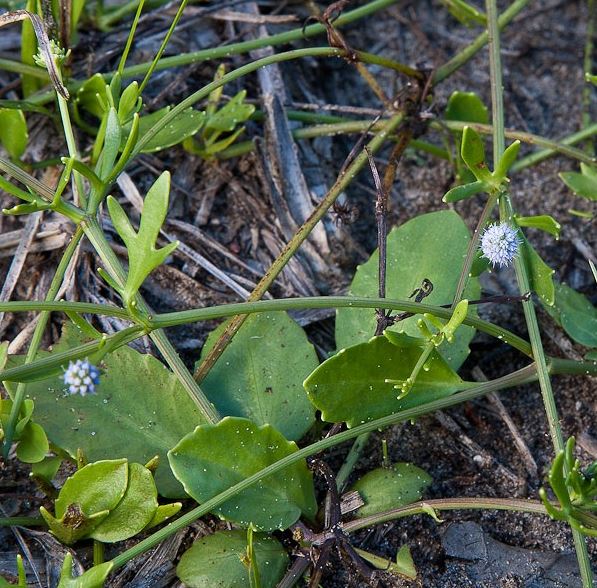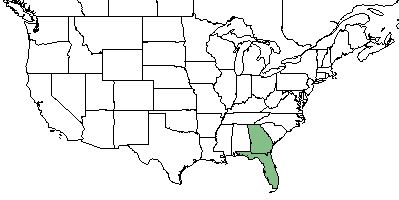Difference between revisions of "Eryngium baldwinii"
| Line 21: | Line 21: | ||
==Taxonomic Notes== | ==Taxonomic Notes== | ||
==Description== <!-- Basic life history facts such as annual/perrenial, monoecious/dioecious, root morphology, seed type, etc. --> | ==Description== <!-- Basic life history facts such as annual/perrenial, monoecious/dioecious, root morphology, seed type, etc. --> | ||
| − | ''Eryngium baldwinii'' is a dioecious biennial or perennial that grows as a forb/herb.<ref name="USDA"/> | + | ''Eryngium baldwinii'' is a dioecious biennial or perennial that grows as a forb/herb.<ref name="USDA"/> It is aromatic, is low, and creeps along the ground. Leaves are 7 cm long and 2.5 cm wide and can be shaped as ovate, oblong, lanceolate, entire, dentate, cleft or pinnatifid. Flowers are dark to light blue 8 mm long and 4 mm wide.<ref name="Tobe et al 1998">Tobe JD, Burks KC, Cantrell RW, Garland MA, Sweeley ME, |
| + | Hall DW, Wallace P, Anglin G, Nelson G, Cooper JR, Bickner D, Gillbert K, Aymond N, Greenwood K, Raymond (1998) Florida Wetland Plants: | ||
| + | An Identification Manual. Florida Department of Environmental Protection, Tallhassee, FL</ref> | ||
==Distribution== | ==Distribution== | ||
Revision as of 15:41, 1 February 2018
| Eryngium baldwinii | |
|---|---|

| |
| Photo by John B. of Blue Moon | |
| Scientific classification | |
| Kingdom: | Plantae |
| Division: | Magnoliophyta - Flowering plants |
| Class: | Magnoliopsida - Dicots |
| Order: | Apiales |
| Family: | Apiaceae |
| Genus: | Eryngium |
| Species: | E. baldwinii |
| Binomial name | |
| Eryngium baldwinii Spreng. | |

| |
| Natural range of Eryngium baldwinii from USDA NRCS Plants Database. | |
Common Name: Baldwin's eryngo[1]
Contents
Taxonomic Notes
Description
Eryngium baldwinii is a dioecious biennial or perennial that grows as a forb/herb.[1] It is aromatic, is low, and creeps along the ground. Leaves are 7 cm long and 2.5 cm wide and can be shaped as ovate, oblong, lanceolate, entire, dentate, cleft or pinnatifid. Flowers are dark to light blue 8 mm long and 4 mm wide.[2]
Distribution
This species occurs from southern Georgia and southern Alabama, south to southern Florida.[3]
Ecology
Habitat
E. bladwinii is found in pinelands, temporary pools, ditches, and other moist to wet sites.[3]
Conservation and Management
Cultivation and restoration
Photo Gallery
References and notes
- ↑ 1.0 1.1 USDA NRCS (2016) The PLANTS Database (http://plants.usda.gov, 01 February 2018). National Plant Data Team, Greensboro, NC 27401-4901 USA.
- ↑ Tobe JD, Burks KC, Cantrell RW, Garland MA, Sweeley ME, Hall DW, Wallace P, Anglin G, Nelson G, Cooper JR, Bickner D, Gillbert K, Aymond N, Greenwood K, Raymond (1998) Florida Wetland Plants: An Identification Manual. Florida Department of Environmental Protection, Tallhassee, FL
- ↑ 3.0 3.1 Weakley AS (2015) Flora of the Southern and Mid-Atlantic States. Chapel Hill, NC: University of North Carolina Herbarium.